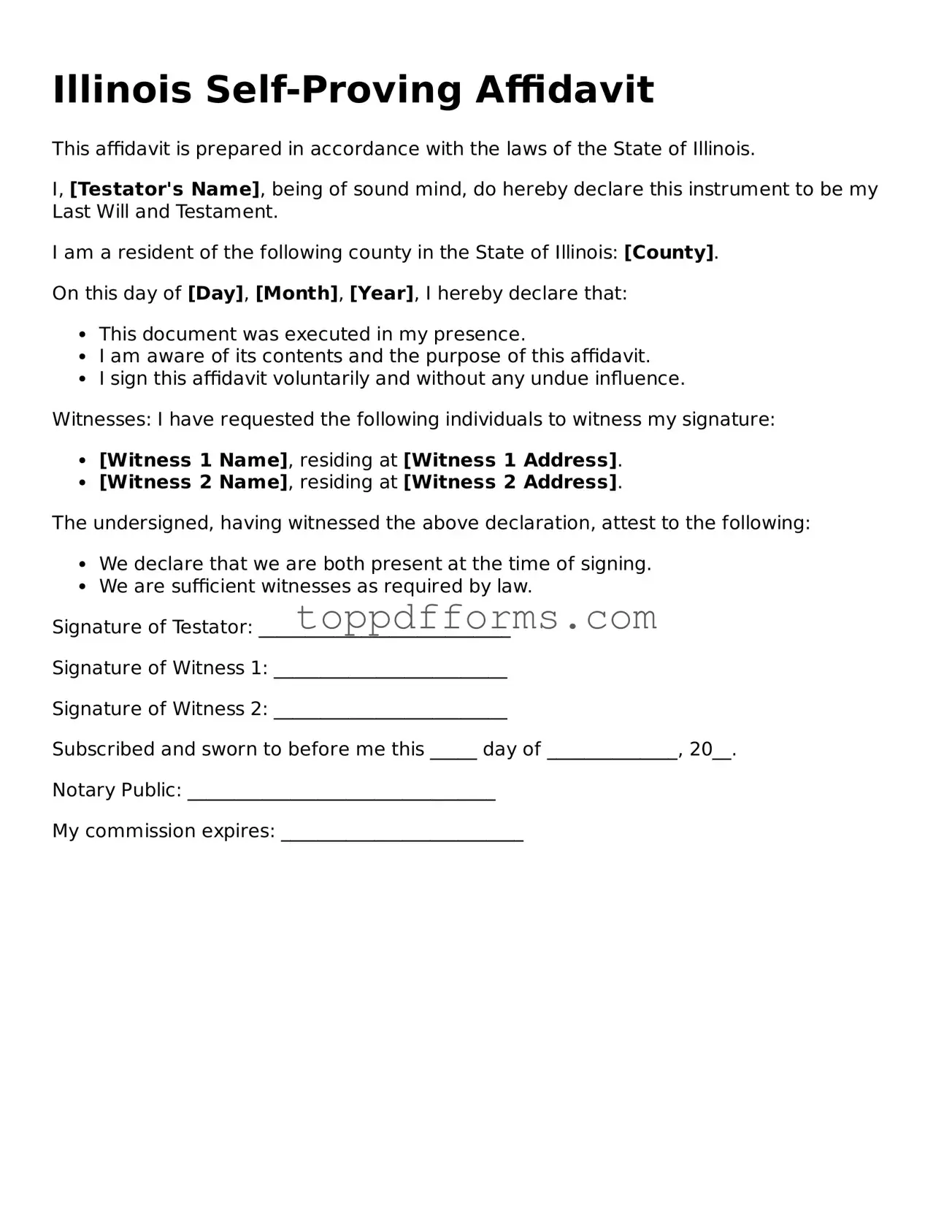Self-Proving Affidavit Document for Illinois State
Things You Should Know About This Form
What is an Illinois Self-Proving Affidavit?
An Illinois Self-Proving Affidavit is a legal document that allows a testator's will to be validated without the need for witnesses to testify in court. This affidavit is typically signed by the testator and witnesses in the presence of a notary public, providing a streamlined process for proving the will's authenticity after the testator's death.
Why should I use a Self-Proving Affidavit?
Using a Self-Proving Affidavit can significantly simplify the probate process. It eliminates the need for witnesses to appear in court, which can save time and reduce potential disputes among heirs. This document serves as strong evidence that the will was executed properly, ensuring that the testator's wishes are honored without unnecessary complications.
How do I create a Self-Proving Affidavit in Illinois?
To create a Self-Proving Affidavit, you need to follow specific steps. First, ensure that your will is properly drafted and signed by you and at least two witnesses. Next, prepare the affidavit, which should include statements affirming that the will was executed in accordance with Illinois law. Finally, sign the affidavit in front of a notary public, who will then notarize the document. This affidavit should be kept with the will to facilitate the probate process.
Is a Self-Proving Affidavit required in Illinois?
No, a Self-Proving Affidavit is not required in Illinois, but it is highly recommended. If a will lacks this affidavit, the probate process may become more complicated, as witnesses may need to be located and questioned about the will's execution. Including a Self-Proving Affidavit can help avoid these potential challenges.
Can I revoke a Self-Proving Affidavit?
What happens if I don't have a Self-Proving Affidavit?
If you do not have a Self-Proving Affidavit, the probate court may require testimony from witnesses to establish the validity of your will. This can lead to delays and additional legal expenses. Without the affidavit, there is also a greater risk of disputes among heirs regarding the will’s authenticity and the testator’s intentions.
PDF Overview
| Fact Name | Description |
|---|---|
| Purpose | The Illinois Self-Proving Affidavit is used to validate a will by confirming that the testator and witnesses signed it willingly and in each other's presence. |
| Governing Law | This form is governed by the Illinois Probate Act, specifically 755 ILCS 5/6-3. |
| Signatures Required | The affidavit must be signed by the testator and at least two witnesses. |
| Notarization | The presence of a notary public is required to witness the signing of the affidavit, adding an extra layer of authenticity. |
| Effectiveness | Once executed, the self-proving affidavit allows the will to be admitted to probate without the need for witness testimony. |
| Form Availability | The form can be obtained from various legal resources, including online legal document providers and local courthouses. |
| Revocation | A self-proving affidavit can be revoked if the testator creates a new will or modifies the existing will in a manner that invalidates the previous affidavit. |
| Importance | This affidavit simplifies the probate process, making it easier for the executor to manage the estate without unnecessary delays. |
Common mistakes
Filling out the Illinois Self-Proving Affidavit form can be a straightforward process, but several common mistakes can lead to complications. One frequent error is failing to include the date of execution. Without a clear date, it becomes difficult to establish when the affidavit was completed, which can create issues regarding its validity.
Another mistake often made is neglecting to provide the required signatures. The form must be signed by the testator and at least two witnesses. If any of these signatures are missing, the affidavit may not be considered valid, potentially jeopardizing the entire estate planning process.
People sometimes overlook the necessity of having the affidavit notarized. A notary public must witness the signatures to ensure authenticity. Without notarization, the affidavit may not hold up in court, leading to delays and additional legal hurdles.
Inaccurate information is another common pitfall. Individuals may mistakenly enter incorrect names, addresses, or other personal details. Such inaccuracies can create confusion and may invalidate the affidavit, so it is crucial to double-check all information before submission.
Additionally, some individuals fail to understand the importance of using the correct form. The Illinois Self-Proving Affidavit is specific to Illinois law, and using a different state’s form can lead to legal complications. It is essential to ensure that the correct form is being utilized for the jurisdiction in question.
Omitting necessary details about the witnesses is also a frequent oversight. The affidavit requires specific information about each witness, including their addresses. If this information is not provided, the affidavit may be challenged, complicating the probate process.
People may also misunderstand the purpose of the affidavit. Some believe it is simply a formality, but it serves a critical role in simplifying the probate process. Failing to recognize its significance can lead to a lack of attention to detail when completing the form.
Lastly, individuals sometimes submit the affidavit without consulting a legal professional. While it is possible to complete the form independently, seeking legal advice can help avoid mistakes and ensure compliance with all relevant laws. Consulting a professional can provide peace of mind and enhance the validity of the affidavit.
Other Common State-specific Self-Proving Affidavit Forms
Self Proving Affidavit Georgia - A comprehensive affidavit aligns closely with the testator’s wishes as expressed in the will.
For those navigating the complexities of vehicle transactions, a comprehensive Motor Vehicle Bill of Sale is crucial to ensure all necessary details are captured. This form serves as proof of sale and offers protection for both parties involved. For additional information, refer to the complete guide on the Motor Vehicle Bill of Sale offered in Colorado.
Free Florida Affidavit Template - The document acts as evidence of the will’s proper execution, reducing legal obstacles in probate.
